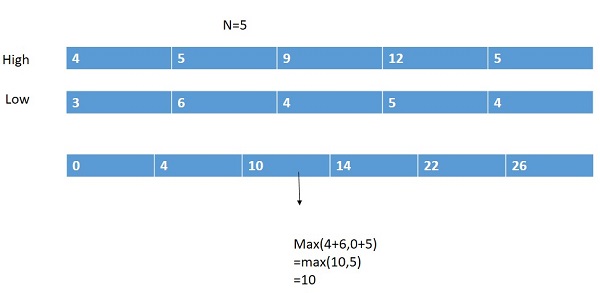Home »
Interview coding problems/challenges
High-effort vs. Low-effort Task Problem
Here, we are going to learn the solution of high-effort vs. low-effort task problem using dynamic programming.
Submitted by Souvik Saha, on June 25, 2020
Problem statement
A list of n days is given to you and there are three columns. One is the day, the second one is high-effort value, and the another one is low-effort value. At a time you can pick only one either high-effort value or low-effort value. You can pick a high-effort task only when you don't take any of the tasks at the day before. You have to find out the maximum task is possible in n days.
Input:
T Test case
T no. of input string will be given to you.
E.g.
2
Day High Low
1 4 3
2 5 6
3 9 4
4 12 5
5 5 4
Day High Low
1 2 3
2 4 2
3 7 8
4 9 7
5 10 6
Constrain:
1≤ n ≤50
Output:
Print the maximum task is possible in n days.
Example
T=2
Input:
5
4 5 9 12 5
3 6 4 5 4
Output:
26 ( 4+ 6+ 12+ 4)
Input:
5
2 4 7 9 10
3 2 8 7 6
Output:
26 (3+2+8+7+6)
Explanation with example
To solve this task problem using dynamic programming approach, we consider these two conditions,
- If we will choose the low effort task then we have to add up this value with the value at (i-1)th index of the calculating array.
- If we will choose the high effort task then we have to add up this value with the value at (i-2)th index of the calculating array.
After getting the value we will choose the maximum value between them.
Example
5
4 5 9 12 5
3 6 4 5 4

C++ Implementation
#include <iostream>
using namespace std;
int max_amount(int* high, int* low, int n)
{
int arr[n + 1] = { 0 };
arr[1] = max(high[0], low[0]);
for (int i = 2; i <= n; i++) {
arr[i] = max(arr[i - 1] + low[i - 1], arr[i - 2] + high[i - 1]);
}
return arr[n];
}
int main()
{
int t;
cout << "Test Case : ";
cin >> t;
while (t--) {
int n;
cout << "Enter the number of elements : ";
cin >> n;
cout << "Enter the High values : ";
int high[n], low[n];
for (int i = 0; i < n; i++) {
cin >> high[i];
}
cout << "Enter the low values : ";
for (int i = 0; i < n; i++) {
cin >> low[i];
}
cout << "Maximum values : " << max_amount(high, low, n) << endl;
}
return 0;
}
Output
Test Case : 2
Enter the number of elements : 5
Enter the High values : 4 5 9 12 5
Enter the low values : 3 6 4 5 4
Maximum values : 26
Enter the number of elements : 5
Enter the High values : 2 4 7 9 10
Enter the low values : 3 2 8 7 6
Maximum values : 26
Advertisement
Advertisement